Minimal Mistakes is a flexible two-column Jekyll theme, perfect for building personal sites, blogs, and portfolios. As the name implies, styling is purposely minimalistic to be enhanced and customized by you 😄.
✨ See what's new in the CHANGELOG.
If you enjoy this theme, please consider supporting me to continue developing and maintaining it.
Note: The theme uses the jekyll-include-cache plugin which will need to be installed in your Gemfile and added to the plugins array of _config.yml. Otherwise you'll throw Unknown tag 'include_cached' errors at build.
- Bundled as a "theme gem" for easier installation/upgrading.
- Compatible with GitHub Pages.
- Support for Jekyll's built-in Sass/SCSS preprocessor.
- Nine different skins (color variations).
- Several responsive layout options (single, archive index, search, splash, and paginated home page).
- Optimized for search engines with support for Twitter Cards and Open Graph data.
- Optional header images, custom sidebars, table of contents, galleries, related posts, breadcrumb links, navigation lists, and more.
- Commenting support (powered by Disqus, Facebook, Google+, Discourse, static-based via Staticman, and utterances).
- Google Analytics support.
- UI localized text in English (default), Brazilian Portuguese (Português brasileiro), Chinese, Danish, Dutch, French (Français), German (Deutsch), Greek, Hindi (हिंदी), Hungarian, Indonesian, Italian (Italiano), Japanese, Korean, Malayalam, Nepali (Nepalese), Persian (فارسی), Polish, Punjabi (ਪੰਜਾਬੀ), Romanian, Russian, Slovak, Spanish (Español), Swedish, Thai, Turkish (Türkçe), and Vietnamese.
This theme comes in nine different skins (including the default one).
air |
contrast |
dark |
|---|---|---|
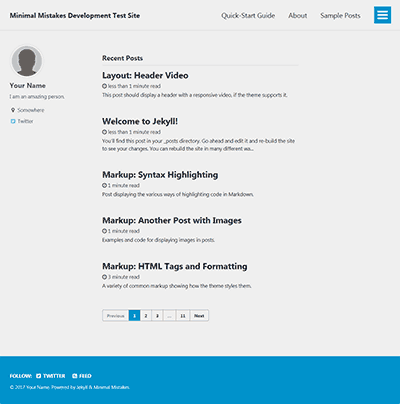 |
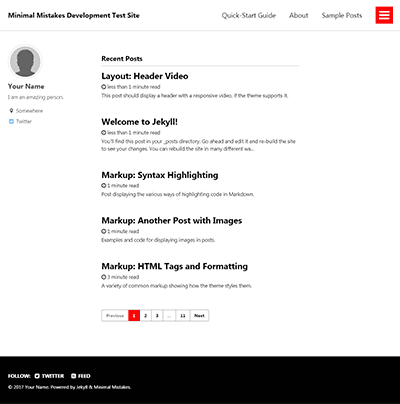 |
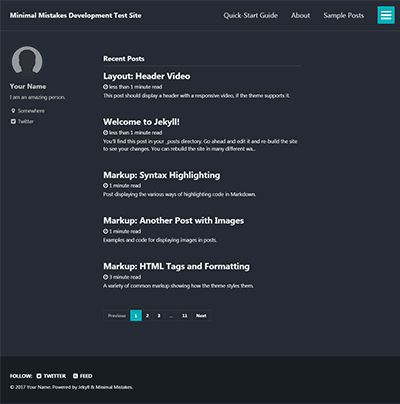 |
dirt |
mint |
sunrise |
|---|---|---|
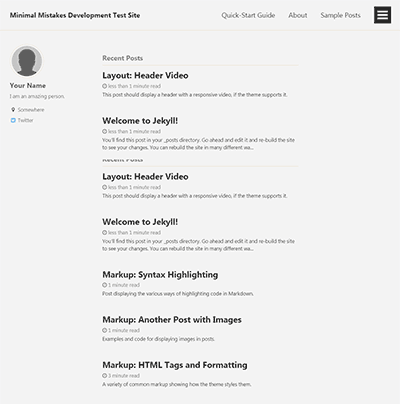 |
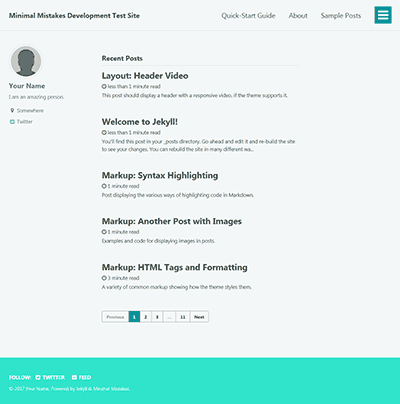 |
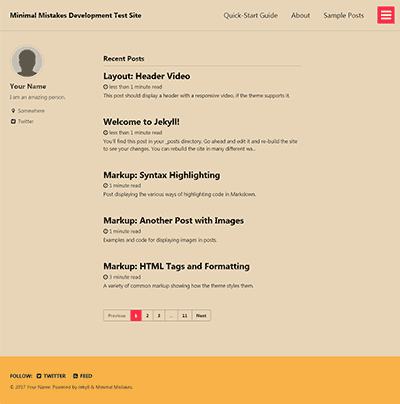 |
aqua |
neon |
plum |
|---|---|---|
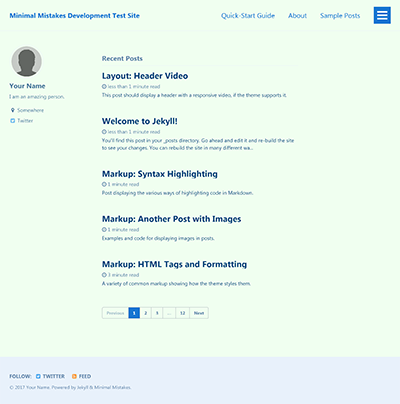 |
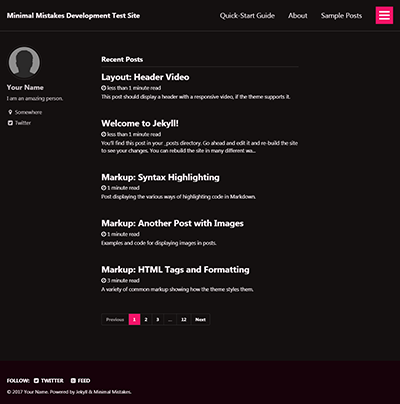 |
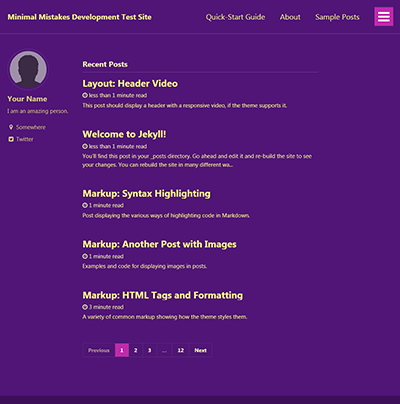 |
| Name | Description |
|---|---|
| Post with Header Image | A post with a large header image. |
| HTML Tags and Formatting Post | A variety of common markup showing how the theme styles them. |
| Syntax Highlighting Post | Post displaying highlighted code. |
| Post with a Gallery | A post showing several images wrapped in <figure> elements. |
| Sample Collection Page | Single page from a collection. |
| Categories Archive | Posts grouped by category. |
| Tags Archive | Posts grouped by tag. |
Additional sample posts are available under posts archive on the demo site. Source files for these (and the entire demo site) can be found in /docs.
There are three ways to install: as a gem-based theme, as a remote theme (GitHub Pages compatible), or forking/directly copying all of the theme files into your project.
With Gem-based themes, directories such as the assets, _layouts, _includes, and _sass are stored in the theme’s gem, hidden from your immediate view. Yet all of the necessary directories will be read and processed during Jekyll’s build process.
This allows for easier installation and updating as you don't have to manage any of the theme files. To install:
-
Add the following to your
Gemfile:gem "minimal-mistakes-jekyll"
-
Fetch and update bundled gems by running the following Bundler command:
bundle
-
Set the
themein your project's Jekyll_config.ymlfile:theme: minimal-mistakes-jekyll
To update the theme run bundle update.
Remote themes are similar to Gem-based themes, but do not require Gemfile changes or whitelisting making them ideal for sites hosted with GitHub Pages.
To install:
-
Create/replace the contents of your
Gemfilewith the following:source "https://rubygems.org" gem "github-pages", group: :jekyll_plugins
-
Add
jekyll-include-cacheto thepluginsarray of your_config.yml. -
Fetch and update bundled gems by running the following Bundler command:
bundle
-
Add
remote_theme: "mmistakes/[email protected]"to your_config.ymlfile. Remove any othertheme:orremote_theme:entry.
Looking for an example? Fork the Minimal Mistakes remote theme starter for the quickest method of getting a GitHub Pages hosted site up and running. Replace sample content with your own and configure as needed.
For detailed instructions on how to configure, customize, add/migrate content, and more read the theme's documentation.
Having trouble working with the theme? Found a typo in the documentation? Interested in adding a feature or fixing a bug? Then by all means submit an issue or pull request. If this is your first pull request, it may be helpful to read up on the GitHub Flow first.
Minimal Mistakes has been designed as a base for you to customize and fit your site's unique needs. Please keep this in mind when requesting features and/or submitting pull requests. If it's not something that most people will use, I probably won't consider it. When in doubt ask.
This goes for author sidebar links and "share button" additions -- I have no intention of merging in every possibly option, the essentials are there to get you started 😄.
When submitting a pull request:
- Clone the repo.
- Create a branch off of
masterand give it a meaningful name (e.g.my-awesome-new-feature). - Open a pull request on GitHub and describe the feature or fix.
Theme documentation and demo pages can be found in the /docs if submitting improvements, typo corrections, etc.
To set up your environment to develop this theme, run bundle install.
To test the theme, run bundle exec rake preview and open your browser at http://localhost:4000/test/. This starts a Jekyll server using content in the test/ directory. As modifications are made to the theme and test site, it will regenerate and you should see the changes in the browser after a refresh.
Michael Rose
- The Noun Project -- Garrett Knoll, Arthur Shlain, and tracy tam
- Font Awesome
- Unsplash
- Jekyll
- jQuery
- Susy
- Breakpoint
- Magnific Popup
- FitVids.JS
- GreedyNav.js
- jQuery Smooth Scroll
- jQuery throttle / debounce
- Lunr
The MIT License (MIT)
Copyright (c) 2013-2019 Michael Rose and contributors
Permission is hereby granted, free of charge, to any person obtaining a copy of this software and associated documentation files (the "Software"), to deal in the Software without restriction, including without limitation the rights to use, copy, modify, merge, publish, distribute, sublicense, and/or sell copies of the Software, and to permit persons to whom the Software is furnished to do so, subject to the following conditions:
The above copyright notice and this permission notice shall be included in all copies or substantial portions of the Software.
THE SOFTWARE IS PROVIDED "AS IS", WITHOUT WARRANTY OF ANY KIND, EXPRESS OR IMPLIED, INCLUDING BUT NOT LIMITED TO THE WARRANTIES OF MERCHANTABILITY, FITNESS FOR A PARTICULAR PURPOSE AND NONINFRINGEMENT. IN NO EVENT SHALL THE AUTHORS OR COPYRIGHT HOLDERS BE LIABLE FOR ANY CLAIM, DAMAGES OR OTHER LIABILITY, WHETHER IN AN ACTION OF CONTRACT, TORT OR OTHERWISE, ARISING FROM, OUT OF OR IN CONNECTION WITH THE SOFTWARE OR THE USE OR OTHER DEALINGS IN THE SOFTWARE.
Minimal Mistakes incorporates icons from The Noun Project creators Garrett Knoll, Arthur Shlain, and tracy tam. Icons are distributed under Creative Commons Attribution 3.0 United States (CC BY 3.0 US).
Minimal Mistakes incorporates Font Awesome, Copyright (c) 2017 Dave Gandy. Font Awesome is distributed under the terms of the SIL OFL 1.1 and MIT License.
Minimal Mistakes incorporates photographs from Unsplash.
Minimal Mistakes incorporates Susy, Copyright (c) 2017, Miriam Eric Suzanne. Susy is distributed under the terms of the BSD 3-clause "New" or "Revised" License.
Minimal Mistakes incorporates Breakpoint. Breakpoint is distributed under the terms of the MIT/GPL Licenses.
Minimal Mistakes incorporates FitVids.js, Copyright (c) 2013 Dave Rubert and Chris Coyier. FitVids is distributed under the terms of the WTFPL License.
Minimal Mistakes incorporates Magnific Popup, Copyright (c) 2014-2016 Dmitry Semenov, http://dimsemenov.com. Magnific Popup is distributed under the terms of the MIT License.
Minimal Mistakes incorporates jQuery Smooth Scroll, Copyright (c) 2017 Karl Swedberg. jQuery Smooth Scroll is distributed under the terms of the MIT License.
Minimal Mistakes incorporates jQuery throttle / debounce, Copyright (c) 2010 "Cowboy" Ben Alman. jQuery throttle / debounce is distributed under the terms of the MIT License.
Minimal Mistakes incorporates GreedyNav.js, Copyright (c) 2015 Luke Jackson. GreedyNav.js is distributed under the terms of the MIT License.
Minimal Mistakes incorporates Jekyll Group-By-Array, Copyright (c) 2015 Max White [email protected]. Jekyll Group-By-Array is distributed under the terms of the MIT License.
Minimal Mistakes incorporates @allejo's Pure Liquid Jekyll Table of Contents, Copyright (c) 2017 Vladimir Jimenez. Pure Liquid Jekyll Table of Contents is distributed under the terms of the MIT License.
Minimal Mistakes incorporates Lunr, Copyright (c) 2018 Oliver Nightingale. Lunr is distributed under the terms of the MIT License.







